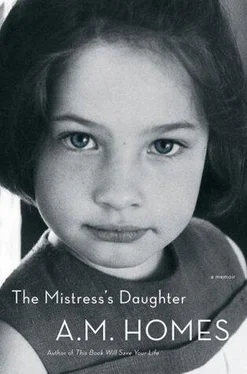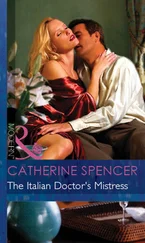The technician calls in a small child who is ahead of us. The little boy screams when they take him.
“You’re not going to do that, are you?” Norman asks.
Worse, I’m thinking, far, far worse.
As Norman walks up to the counter, I notice that his butt looks familiar; I am watching him and I’m thinking: There goes my ass. That’s my ass walking away. His blue sport coat covers it halfway, but I can see it broken into sections, departments of ass, high and low just like mine. I notice his thighs — chubby, thick, not a pretty thing. This is the first time I have seen anyone else in my body.
I stare as he turns and comes back to me. I look down at his shoes, white loafers, country-club shoes, stretched out, fading. Inside the shoe, his feet are wide and short. I look up; his hands are the same as mine, square like paws. He is an exact replica, the male version of me.
“Fine thing,” Norman says, seeing me stare.
I go first. I roll up my sleeve. The technician pulls on his gloves, assembles his tubes, and ties the rubber tourniquet around my arm. I make a fist. Norman is watching.
The needle goes in, a sharp metal prick.
I look at Norman. It feels strange. I am giving blood for this man, I am letting my flesh be punctured to prove that I am of him. It is beyond sexual.
“Let go of the fist,” the technician says and I relax my hand.
The blood is drawn, tubes and tubes of it, and then there is cotton on my wound and a Band-Aid over it.
I have allowed this because I understand the need for proof, for some true measure of our relationship, and also because I have a fantasy that there is something in it for me, that Norman will keep his word, that he will take me into his family, that I will suddenly have three brothers and a sister — a new and improved spare family.
“Please sign here.” The technician hands me the tubes, one at a time.
“What?”
“You have to sign the tubes.”
They are warm in my palm, filled with the chemical sum of who and what I am. I sign quickly, hoping not to faint. I am holding myself in my hands.
Norman is next. He takes off his jacket, revealing short shirt sleeves, sad-old-guy style. His arms are plump, pale, almost fluffy. There is something so white about him, so soft, so exposed that it is perverse. He lays out his arm. The technician ties it off, swabs it, and I look away unable to watch this strange genetic striptease.
I am sickened by it all. I wait in the hall. I do not watch him holding his blood, signing his tubes. He comes out of the room, puts his jacket back on, and we are out the door.
“I would have liked to take you for a nice lunch if you’d worn something better,” he says when we are in the hallway.
I am dressed perfectly well — in linen pants and a blouse. DNA testing is not a black-tie occasion. I am tempted to say, That’s okay — I would have liked you to be my father if you weren’t such a jerk. But I am so stunned that I become stupidly apologetic. I am not wearing what he wanted; I am not wearing a dress. I am not meeting his fantasy of his daughter.
We go to a less-than-mediocre restaurant down the block. People seem to know him there. He introduces me to the maître d’ as though that means something. We sit down. The tablecloths are green, the napkins polyester.
“You don’t wear jewelry,” Norman says.
I am single, I live in New York City, I am not wearing a dress. I know exactly what he is thinking.
I say nothing. Later, I’ll wish that I’d said something, I’ll wish that I’d told him the truth. I have no jewelry, but if you want to throw me some diamonds I’d be glad to wear them. I come from a family that doesn’t do that sort of thing. I grew up boycotting grapes and iceberg lettuce because they weren’t picked by union workers.
What kind of father makes his child travel to another city to prove that she is his child and then criticizes her for not wearing the right clothes to the blood test, for not wearing jewelry she doesn’t own to the lunch she didn’t know she was having?
“How will you feel if the test comes back and I’m not your father?”
You’re my father, I think. I wasn’t positive before, but now, seeing you, seeing your ass, my ass — I’m sure.
The heat is stupefying. I am being twisted like pulled taffy. I walk as though I have been hit with something, blasted. I have become a stranger to myself.
To be adopted is to be adapted, to be amputated and sewn back together again. Whether or not you regain full function, there will always be scar tissue.
Back at the house, my mother wants to do something to make it better. She takes me on a picnic. We go to Candy Cane City — the park of my childhood — and sit at a table under the trees looking out at the merry-go-round, the swing set, the aluminum slide. All of it empty now, deserted in this scorching heat wave. I put my hand on the slide, the metal is searingly hot — it feels good.
My mother unwraps a bologna sandwich. This is proof of how hard she is trying. In our house there is no bologna, no white bread. This is my favorite sandwich from childhood, the one I got only for field trips and special occasions. She pulls a bag of potato chips and a cold Coke out of the bag, replicating my earliest idea of the sublime. We look out at the tennis courts, the basketball hoops, the water fountain, all of it indelibly etched in my memory. I could come to this park in my sleep, just as I have come to it often in my fiction.
“Take me for a ride,” I say.
“Tomorrow,” she says. “Tomorrow I’ll take the day off work and we’ll go somewhere.”
In the morning we leave. The motion of the car is soothing — it makes up for my inability to move myself, it fulfills my need for someone else to move me, to carry me. The road unfolds.
I don’t tell my mother what happened when I went for the blood test, I do not tell her how truly depressed I am. I don’t say anything because anything I say will make her anxious, angry, and then I will have to deal with her feelings. And at the moment I am struggling to understand my own.
I wish I had a video of Norman, of his ass walking away. I wish I had him on tape saying, You’re not dressed right. I wish I had Ellen on audio, her misplaced projections, her odd habit of seeming to confuse me with her dead mother, accusing me of not paying enough attention to her, not doing enough for her.
I wish I had it all in such a way that it could be labeled and laid out on a long table — as evidence.
My mother is driving us into the past, to Berkeley Springs, West Virginia, a dark, dank old town. This is where George Washington went when he wanted to take a soak; home of the oldest mineral bath in the country — my grandparents used to take us here.
This is a place from my past that feels familiar, untouchable, unchanged. I am glad to be returned to something that predates me. The bathhouse is divided into ladies’ and men’s; everyone there is a million years old, dating directly back to George Washington. I imagine it is like a Swedish sanitarium; there is something deeply medicinal about it — we have come for a cure.
Soaking in the holy antique waters is cleansing — lying on the slab of a table while an old woman kneads my flesh is equal to the moment I am in. It is the perfect escape.
We have our treatments and then we go to the old hotel for club sandwiches and head home.
On the phone, Norman tells me he has something for me, something he wants to give me; first he tells me he will send it to me and then he says he will wait and give it to me in person. I am thinking it is a family heirloom, something of his, of his mother’s, something that came on the Arc or the Dove, something that the Nazi brought back, something that his father gave his mother, something that he wanted to give Ellen. Whatever it is, he never gives it to me, he never mentions it again.
Читать дальше












